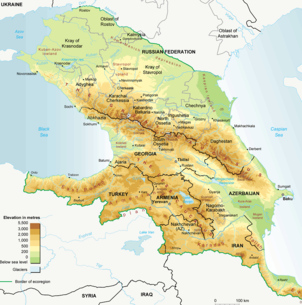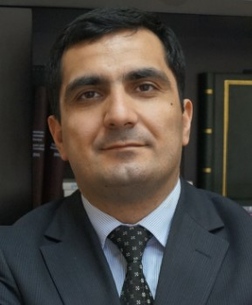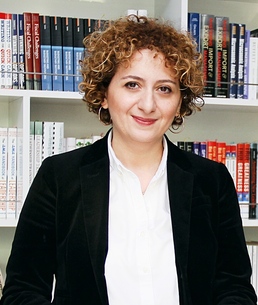Training and Development in the South Caucasus Region
May 04, 2015

Caucasus

Vugar Ahmadov, Director of the Research and Development Center at the Central Bank of the Republic of Azerbaijan

Tamar Japaridze, Director of the Academy of the Ministry of Finance in Georgia

Nune Kirakosyan, Head of External Relations and Training Department at the Central Bank of Armenia
We are continuing our series of interviews on training and development with representatives of country authorities. This time, we posed a few questions to three JVI Training Directors in the South Caucasus Region: Mr. Vugar Ahmadov (VA), Director of the Research and Development Center at the Central Bank of the Republic of Azerbaijan; Ms. Tamar Japaridze (TJ), Director of the Academy of the Ministry of Finance in Georgia; and Ms. Nune Kirakosyan (NK), Head of External Relations and Training Department at the Central Bank of Armenia.
1. How does JVI training help your organization develop?
VA: Courses and seminars organized by the JVI make a major contribution to the development of the required core competences and skills of staff at the Central Bank of the Republic of Azerbaijan (CBRA). A well-balanced skill set is obtained via training at the JVI. This consists mainly of policy analysis tools and latest research that are relevant to the effective conduct of monetary, financial stability, and prudential policies, as well as to the development of payment systems. The JVI also provides networking opportunities that have been capitalized into close partnerships with other central banks and financial regulators.
TJ: JVI training covers topics that have immediate policy relevance for Georgia. Being taught by experts and exchanging experiences with peers facilitates the learning and development of our employees and builds up the capacity of our ministry. The Chief Economist at the Ministry of Finance once said that courses offered by the JVI played an important role in his professional and individual growth and enabled him to get acquainted with modern tools and practical skills for his work.
NK: The continuous training and development of staff has been always a high priority for the Central Bank of Armenia (CBA). More than 20 years of effective cooperation with the JVI has contributed significantly to our goal of staff development. The seminars and workshops organized by the JVI and conducted by high-level professionals have enriched the skills and knowledge of our personnel in various fields. This is why the JVI is considered one of the CBA’s most effective and appreciated partners in HR development.
2. Can you give any concrete examples of how your organization benefits from the skills and knowledge obtained by staff at JVI training?
TJ: Staff members who have been trained at the JVI can be distinguished by their greater motivation, enhanced interest in their work, deeper knowledge, and better skills for executing the tasks in their areas. It also gives them more confidence when proposing policy measures for our country. One staff member at our ministry commented, “JVI training has been a great help in starting my pathway to a successful career. I have learned a variety of practical tools for analyzing budgetary processes to guide my future work. I also made many wonderful creative friends at the JVI.”
NK: Professionals from the monetary policy, financial stability and statistics departments of CBA have mostly benefited from training provided by the JVI. In particular, it has helped our staff compile better statistics, conduct more effective and detailed monetary policy analysis, and assess the risks in the financial system, including their possible economic impacts. This of course enhanced the CBA’s ability to fulfil its primary objective of price and financial stability.
VA: Let me mention three concrete areas. First, courses at the JVI have contributed to the design of effective monetary policy instruments and informed policy implementation at the CBRA. Second, the knowledge and skills staff have gained, including for example at the course on macroeconomic diagnostics, help our monetary policy team to produce high-quality diagnostic reports for key stakeholders, especially the central bank Monetary Policy and Financial Stability committees. Additionally, the course on monetary policy analysis helped form the basis for a robust policy analysis model that uses the foundations of New Keynesian theory and a forecasting instrument for filtering rich data in a multivariate framework. Third, skills gained in the fields of financial stability and macroprudential policy laid the theoretical and empirical foundations for continuing financial and prudential research as well as diagnostics at our central bank.
3. Who determines how much training your staff needs?
NK: The training needs of CBA staff are determined according to our annual strategy, with annual training plans, which consider objectives, identification of critical activities, as well as global economic and policy challenges, formulated by CBA management.
VA: The CBRA emphasizes the improvement of institutional capacity. We encourage staff to participate in seminars and training sessions that will help them successfully complete their short-term and long-term job tasks. At the same time, participation in various training events is through a competitive process that is based on the strategic targets for every functional department or division. Managers of a department, in close collaboration with human resources department staff, produce a development plan for each staff member that also covers training needs. In the last five years, members of our staff have attended 96 seminars at the JVI.
TJ: Training needs are determined by our Human Resources Department in consultation with the heads of departments and their staff. The process is often facilitated by the Academy of the Ministry of Finance of Georgia. Identified training needs are evaluated against the goals of the specific department and the Ministry as a whole and a draft training plan is prepared, which is then approved by the Deputy Minister. While the Ministry’s Academy addresses many of our needs, it also actively encourages staff to take courses at the JVI, where participants are offered more policy-oriented courses that reflect global economic challenges and are taught by the best specialists in their fields. When they are at the JVI, away from their workplace, staff members are more focused on learning, enjoying the study process and establishing useful contacts with colleagues from other countries.













